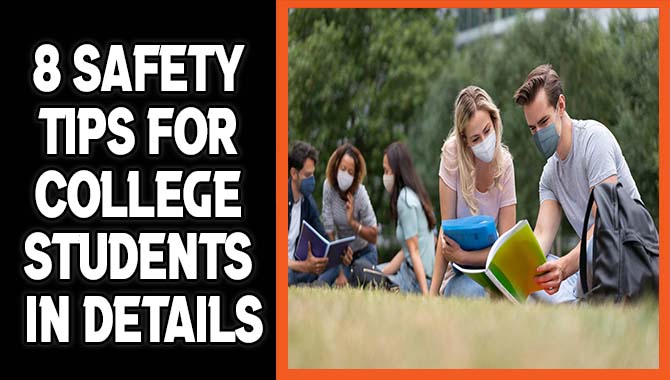College is a time of exploration and new experiences. However, it can also be a time when students learn to navigate a new environment and make new friends.
That said, it’s important to be safe when attending college events and keeping safe is essential to ensure a positive experience. And with it comes all the excitement, new friends, and perhaps a little too much freedom, not to mention the risk of getting into trouble.
Whether you’re a first-time college student or an experienced one, taking some precautions and staying safe is always a good idea.
We’ll share eight safety tips for college students that will help you stay safe both on campus and off. From staying informed about campus security policies to ensuring you know how to signal for help in an emergency, read on to stay safe and protected.

8 Safety Tips For College Students

College life can be exciting and fun, but it’s important to be safety conscious and aware of your surroundings. Always be aware of your surroundings and take precautions to avoid being victimized. Here are eight safety tips for college students:
1. Become Familiar

It’s important to become familiar with the safety tips for college students in case something goes wrong. Here are a few of the most important things to know:
– Never leave your drink unattended or walk away from it without knowing where it is.
– Stick to well-lit areas and avoid going out at night.
– Don’t carry large amounts of cash around – use debit or credit cards instead.
– Use common sense when it comes to parties and socializing – don’t get drunk, and don’t take risks.
– Always be aware of your surroundings and report any suspicious activity immediately.
2. Alert Your Friends

Staying safe on campus is of utmost importance. Ensure to stay informed about what’s happening by following campus safety alerts and warnings by the university or local authorities. When venturing out at night, be extra cautious, as numerous areas around campus are dark and dangerous.
Stick to well-lit paths and avoid walking alone or in isolated areas. If you happen to find yourself in such an unsafe location, remember your phone can come in handy for help! And lastly, don’t forget your sense of alcohol responsibility – drink responsibly.
3. Lock-Up

Keeping your personal belongings safe on campus is important, no matter where you are. Locking them up when you’re not using them will make it harder for thieves to get their hands on them. Make sure to use a security key or code to open the door in an emergency – this way.
Nobody can enter without your permission and potentially hurt or even kill you. It’s also important to stay alert at all times, especially when walking around campus late at night or early morning hours. Always be aware of who’s around and what they’re doing – if something seems off, don’t hesitate to speak up.
4. Stay Updated
It is important to stay up-to-date with the latest safety tips and advice. Be aware of your surroundings and be vigilant of anything that could harm you, especially if you are alone. Lock your doors at all times in emergencies, keep personal belongings safe, and don’t hesitate to call for help if things get out of hand.
5. Don’t Update
Keeping your online accounts and personal information safe is of the utmost importance. Always use a secure login when accessing your accounts, make sure you are using strong passwords, and don’t reveal them to anyone.
It’s also important not to click on unsolicited emails or messages that offer deals or other tempting offers – just delete them without opening them.
When browsing the internet, be extra cautious about who you are communicating with and what they know about you. Remember that anything you do online can potentially be seen by anyone who happens to have access to your computer at any time. Make sure all activity related to your online persona is kept confidential.
6. Have Safety Tools

As college students, we must take safety seriously. When walking on campus or going out in general, always have a phone charger and be alert to any suspicious behavior.
Stay aware of your surroundings and know the emergency escape routes in case of an emergency. Never leave your drink unattended – better safe than sorry. And finally, don’t forget to register for campus safety alerts if you want updates on specific security threats or happenings.
7. Self-Defense Moves

The best way to stay safe is to be alert and well-prepared. Make sure you dress in inconspicuous clothes to blend in if needed. Stay aware of your surroundings, and be on the lookout for any suspicious activity or people.
If something does happen, have a backup plan ready in case things go south quickly. Go into an emergency with confidence by knowing how to handle yourself effectively.
8. Monitor Your Drinks
Drink and drive. Avoid drugs at all costs – they will only make you easy prey. If you are going out, always monitor your drink and be aware of how much you drink. Generally, it is always best to stay sober if possible – college kids tend to party harder when they’re not injured or in jail.
Tips For Staying Safe During Study Time

Orient yourself. Get a campus map and learn the locations of all your classes. This will help you find your way around campus and stay on track with your studies. When it comes to studying, there are a few things that you should always keep in mind. Here are some tips to help you stay safe while you’re in the library or studying at your dorm:
– Avoid bringing any kind of weapon with you. This includes knives, guns, and even pens and pencils.
– Make sure your devices are turned off and locked away when not using them.
– Stay aware of your surroundings and be careful who you talk to. Stick to people you know and trust, and be careful what information you share.
– If something seems strange or dangerous, don’t hesitate to call for help. College campuses have 24/7 emergency services available to get the help you need without worrying about anything else.
Conclusion
When it comes to college, there are a lot of new and exciting opportunities but also many potential dangers. Students need to be aware of the safety tips available to them so they can make the most out of their time at school.
College can be an exciting time, but it can also be a risky time. Follow these safety tips to make your college experience as safe as possible.
From staying alert during study time to staying safe on campus, read through this blog and take note of the safety tips that are relevant to you. We hope that you will find this information helpful and enjoy your college years to the fullest.
Frequently Asked Questions
1.How Do I Avoid Getting Sick While I’m On Campus?
Ans: To avoid getting sick on campus, follow these eight safety tips:
1. Wash your hands often – not just when you’re eating, but also before you eat, touch anything, or go to the bathroom.
2. Avoid touching your face – especially between the eyes – because germs can spread this way.
3. Stay away from people who are sneezing or coughing – these people are likely to be contagious.
4. Stay informed about current outbreaks and ensure you take all the necessary precautions to prevent infections.
5. Make sure that food is cooked properly and avoid raw meat and eggs if possible.
2.What Are Some Of The Most Common Foodborne Illnesses?
Ans: Some of the most common foodborne illnesses are Salmonella, Listeria monocytogenes, and Campylobacter jejuni. Salmonella is a bacterium that can cause diarrhea, fever, and abdominal pain.
Listeria monocytogenes is another dangerous bacterium that can cause fever, sepsis (a potentially life-threatening condition), miscarriage, stillbirths, and neonatal deaths. E. coli O157:H7 causes severe stomach cramps, watery diarrhea, electrolyte imbalances, and vomiting in humans.
3.What Should I Do If I Get Sick During My College Career?
Ans: If you get sick during your college career, follow these basic guidelines to help mitigate the situation.
1. Wash your hands often: Hand washing is one of the best ways to avoid getting sick in the first place. Washing your hands will help to prevent the spread of germs, which in turn will reduce your chances of becoming ill.
2. Drink plenty of fluids: When you’re feeling sick, it’s especially important to drink plenty of fluids to rehydrate yourself and fight off any fever. It’s also important to stay well-hydrated, so you don’t become dehydrated and exhausted.
3. Rest as much as possible: When you’re sick, it’s important to rest as much as possible so that you don’t further aggravate your symptoms.
4.Do I Need To Take Any Precautions When Drinking Alcohol Or To Use Drugs?
Ans: There are a few precautions that all drinkers and drug users should take into account. Here are a few:
1. Always drink responsibly and be aware of your surroundings. If you’re drinking at home by yourself, for example, make sure to have an emergency phone number or friend in case of an emergency.
2. When using drugs, be cautious, as some can have adverse effects on the body long after using them. For example, MDMA (ecstasy) is a party drug that can cause long-term brain damage if taken excessively or incorrectly.
5.Is It Safe To Walk Around Campus At Night?
Ans: While it is always important to exercise caution when walking around campus at night, here are some safety tips you can follow: – Always keep your identification and bank cards with you at all times.
This way, if something does happen and you need to report the crime, you will have physical proof of who you are. – Walk in well-lit areas.
Campus security patrols these areas regularly, so it’s important to make yourself visible to them. – Never leave drinks or food unattended. If someone sees you do this, they may think you’re trying to steal their food or drink.

Leave a Reply